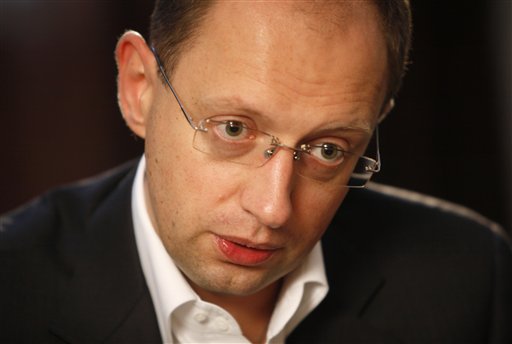
Yanukovych Awaits a Third Term or a Third Sentence
Publication: Eurasia Daily Monitor Volume: 9 Issue: 25
By:

Front for Change party leader, Arseniy Yatseniuk, said in an interview in Fokus magazine “In effect in the country there is a two party system. The post-Soviet system confronts the pro-European, the past versus the future” (https://focus.ua/politics/213418/). This view was repeatedly stated by opposition leaders on the January 22 anniversary of Ukraine’s 1918 independence on St. Sophia Square in Kyiv (https://www.pravda.com.ua/photo-video/2012/01/22/6925958/).
Former Deputy Secretary of the Ukrainian National Security and Defense Council, Stepan Havrysh, described the gloomy economic and energy situation in Ukraine: “Our current external debt (public and private) is about $135 billion, our budget deficit is more than $30 billion. External debt, which we need to return next year, is almost $7 billion. Clearly, in these conditions, without external borrowing, which we are unable to do [we have a problem]. And [as] the IMF has ceased cooperating with Ukraine, this is obvious. The World Bank under these circumstances will not give any money [and] will not help.” He added: “In 2008 there were 17 Western banks, which had 40 percent of the banking system assets working in Ukraine. Today, most of them have left Ukraine, and capital repatriation by foreign investors continues. Euro 2012 has not attracted major European, US or Chinese investors to Ukraine. Privatization on which we rely takes place between a handful of groups who [deliberately] devalue these assets.” This means Ukraine stands “between the surrender of key assets, and technical default.” One solution really could be selling off of the gas transport system, or key assets (https://www.radiosvoboda.org/content/article/24424542.html).
Tim Ash, Global head of Emerging-Market Research and Strategy at the Royal Bank of Scotland, told Jamestown that it is disappointing Ukraine has not been able to negotiate a cheap gas contract with Russia as “this will put pressure on the fiscal and external financing side, with the current account deficit already widening and reserves dwindling.”
Peterson Institute for International Economics Senior Fellow, Anders Aslund, also notes that “Ukraine’s finances appear unsustainable” (https://www.kyivpost.com/news/opinion/op_ed/detail/114846/). The respected weekly newspaper Dzerkalo Tyzhnia asked 20 Ukrainian experts whether a change in government is possible in 2012, to which most replied negatively (https://dt.ua/POLITICS/chi_mozhliva_zmina_vladi_v_ukrayini_nastupnogo_roku-94880.html).
Ukraine’s democracy is in free fall, according to Freedom House and the Economist Intelligence Unit’s (EIU) Democracy Index. Freedom House downgraded Ukraine from “free” in 2010 to “partly free” in 2011. This month, Freedom House reported that “the steepest decline in the institutions of freedom has taken place in Ukraine” from 3 to 4. A ranking of 5.5-7 would classify Ukraine as “not free” (i.e. authoritarian, as in Belarus and Russia). The EIU reported Ukraine dropped from a “flawed democracy” (2010) to a “hybrid regime” (2011) or 67th to 79th in 2010-2011.
The 2012 Index of Economic Freedom compiled by the Heritage Foundation and The Wall Street Journal ranked Ukraine last at 43rd in Europe and worldwide at 163rd, behind Belarus (153) and Russia (144). This represents a massive drop since 2008, when Ukraine was ranked 133rd (See https://www.rferl.org/content/ukraines_economic_rankings_mired_in_deline_despite_attempts_at_reform/24453299.html). The Yanukovych regime has limited options to deal with these mounting crises. Ash, like Havrysh and former US Ambassador Steven Pifer (https://www.brookings.edu/opinions/2011/1226_ukraine_pifer.aspx), believe bad relations with the EU and the IMF has made the situation worse. Ash told Jamestown, “Something has to change from the current policy mix.”
If the Yanukovych administration takes Ukraine into the CIS Customs Union and transfers the gas pipelines to a Russian controlled consortium, as Prime Minister Nikolai Azarov is supporting, severe political instability will be inevitable (https://www.pravda.com.ua/news/2012/01/20/6921766/). Ukrainian elites have held a consensus for two decades to not give up the pipelines and a February 2007 law that bans lease, rent or sale of the pipelines, which Yulia Tymoshenko mobilized 430 (out of 450) parliamentary deputies to adopt, was backed by the Party of Regions. The transfer of the gas pipelines, following the unconstitutional extension of the Black Sea Fleet base until 2042-2047, would be seen across the entire opposition as treason.
These factors are compounded by the Tymoshenko factor in the 2012 and 2015 elections. Ukrainian expert Serhiy Kudelia, currently at George Washington University, told Jamestown on January 23, 2012, that “by taking revenge on Yulia Tymoshenko, his political rival, Yanukovych set a new precedent in Ukrainian politics as never before have Ukrainian leaders prosecuted their predecessors.” Kudelia added, “However, this also poses a new strategic dilemma for Yanukovych. He would either have to stay on as president for a third term in 2020 or risk receiving a third, possibly now life-long term in jail once he leaves the presidency. Whoever replaces him in the president’s office will now have a free hand and sufficient grounds to put Yanukovych behind bars for good.”
Calls for Yanukovych to be impeached and for the Party of Regions to be made illegal and its leaders criminally charged are growing louder and span the entire opposition spectrum (see Yatseniuk, Anatoliy Grytsenko, and nationalist leader Oleh Tyahnybok in Ukrayinska Pravda, January 15, 22). The former Defense Minister Anatoliy Grytsenko, currently the head of parliament’s committee on national security and defense, described the Yanukovych administration as a “Junta,” that has “usurped power” and is “destroying the country” (https://www.kyivpost.ua/opinion/op-ed/partiya-regioniv-bude-rozpushena-yiyi-vishe-kerivnictvo-pide-pid-sud-odrazu-pislya-prezidentskih-viboriv-35236.html).
It will be impossible for Yanukovych to win a second term with his popularity at around ten percent as this would require massive amounts of election fraud (experts believe fraud can be hidden only up to approximately ten percent – and even that is pushing it). In December 2004, Prime Minister Yanukovych presided over a record 12 percent GDP growth and received 44 percent support in the repeat second round. Today, his popularity is collapsing in his home bases of Donbas and the Crimea. Massive election fraud of this magnitude is impossible in Ukraine, where opposition support dominates one half of the country. Unlike in Belarus and Russia, where Soviet and Great Power Russian nationalism underpins the Lukashenka and Putin regimes, the Party of Regions cannot rely on nationalism to stay in power. The Party of Regions mobilizes its voters against Ukrainian nationalism (i.e. “Orange” political forces). High levels of political instability in the 2012 elections and in the run up to the 2015 elections could be compounded by Yanukovych and his administration fearing criminal charges if they are removed from office. This charged atmosphere makes it difficult to imagine how such political instability could end peacefully, unlike the non-violent 2004 Orange Revolution. Such an eventuality would seriously threaten the unity of Ukraine.




